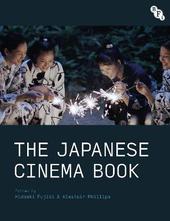
|
The Japanese Cinema Book
Paperback / softback
Main Details
| Title |
The Japanese Cinema Book
|
| Authors and Contributors |
Edited by Hideaki Fujiki
|
|
Edited by Alastair Phillips
|
| Physical Properties |
| Format:Paperback / softback | | Pages:624 | | Dimensions(mm): Height 246,Width 189 |
|
| Category/Genre | Film theory and criticism |
|---|
| ISBN/Barcode |
9781844576784
|
| Classifications | Dewey:791.430952 |
|---|
| Audience | | Tertiary Education (US: College) | |
|---|
| Illustrations |
100 bw illus
|
|
Publishing Details |
| Publisher |
Bloomsbury Publishing PLC
|
| Imprint |
BFI Publishing
|
| Publication Date |
16 April 2020 |
| Publication Country |
United Kingdom
|
Description
The Japanese Cinema Book provides a new and comprehensive survey of one of the world's most fascinating and widely admired filmmaking regions. In terms of its historical coverage, broad thematic approach and the significant international range of its authors, it is the largest and most wide-ranging publication of its kind to date. Ranging from renowned directors such as Akira Kurosawa to neglected popular genres such as the film musical and encompassing topics such as ecology, spectatorship, home-movies, colonial history and relations with Hollywood and Europe, The Japanese Cinema Book presents a set of new, and often surprising, perspectives on Japanese film. With its plural range of interdisciplinary perspectives based on the expertise of established and emerging scholars and critics, The Japanese Cinema Book provides a groundbreaking picture of the different ways in which Japanese cinema may be understood as a local, regional, national, transnational and global phenomenon. The book's innovative structure combines general surveys of a particular historical topic or critical approach with various micro-level case studies. It argues there is no single fixed Japanese cinema, but instead a fluid and varied field of Japanese filmmaking cultures that continue to exist in a dynamic relationship with other cinemas, media and regions. The Japanese Cinema Book is divided into seven inter-related sections: * Theories and Approaches * * Institutions and Industry * * Film Style * * Genre * * Times and Spaces of Representation * * Social Contexts * * Flows and Interactions
Author Biography
Hideaki Fujiki is Professor of Cinema Studies and Japanese Studies at Nagoya University, Japan. He is the author of Making Personas: Transnational Film Stardom in Modern Japan and his essays have appeared in Stephanie Dennison and Song Hwee Lim (eds.) Remapping World Cinema: Identity, Culture and Politics in Film, Cinema Journal, Japan Forum, Review of Japanese Culture and Society, and Iconics, and he has contributed to the Oxford Handbook of Japanese Cinema. Alastair Phillips is Professor of Film Studies at the University of Warwick, UK. He is the author of City of Darkness, City of Light: Emigre Filmmakers in Paris 1929-1939 and Rififi: A French Film Guide. He is the co-author of 100 Film Noirs (BFI Screen Guides) and the co-editor of Journeys of Desire: European Actors in Hollywood; Japanese Cinema: Texts and Contexts and A Companion to Jean Renoir. His articles on international film history and aesthetics have appeared in numerous journals and books. He is an editor of the journal Screen and serves on the Editorial Advisory Boards of The Journal of Japanese and Korean Cinema and the BFI Film Classics series.
ReviewsI'd recommend most of this book to anyone, but two chapters in particular [about manga adaptations in Japanese cinema] will leap out at readers of this blog. * All the Anime blog * With its preponderance of Japanese authors and the impressive variety of approaches it models, this volume marks a new era in the study of Japanese cinema. It presents new spins on old topics, and opens up any number of new avenues of inquiry. I can think of no other book that reveals the sheer richness of Japanese cinema to this degree. The Japanese Cinema Book is, simply, superb. -- Markus Nornes, Professor of Asian Cinema Department of Film, Television and Media, Department of Asian Languages and Cultures, Penny Stamps School of Art & Design, University of Michigan, USA Fujiki and Phillips' edited collection of wide-ranging essays represents a timely intervention into the field of Japanese cinema studies by a diverse group of international scholars. Its breadth and coverage will ensure it assumes a prominent position as a standard text within the field. -- Isolde Standish PhD Emeritus Reader in Film and Media Studies SOAS, University of London, UK.
|